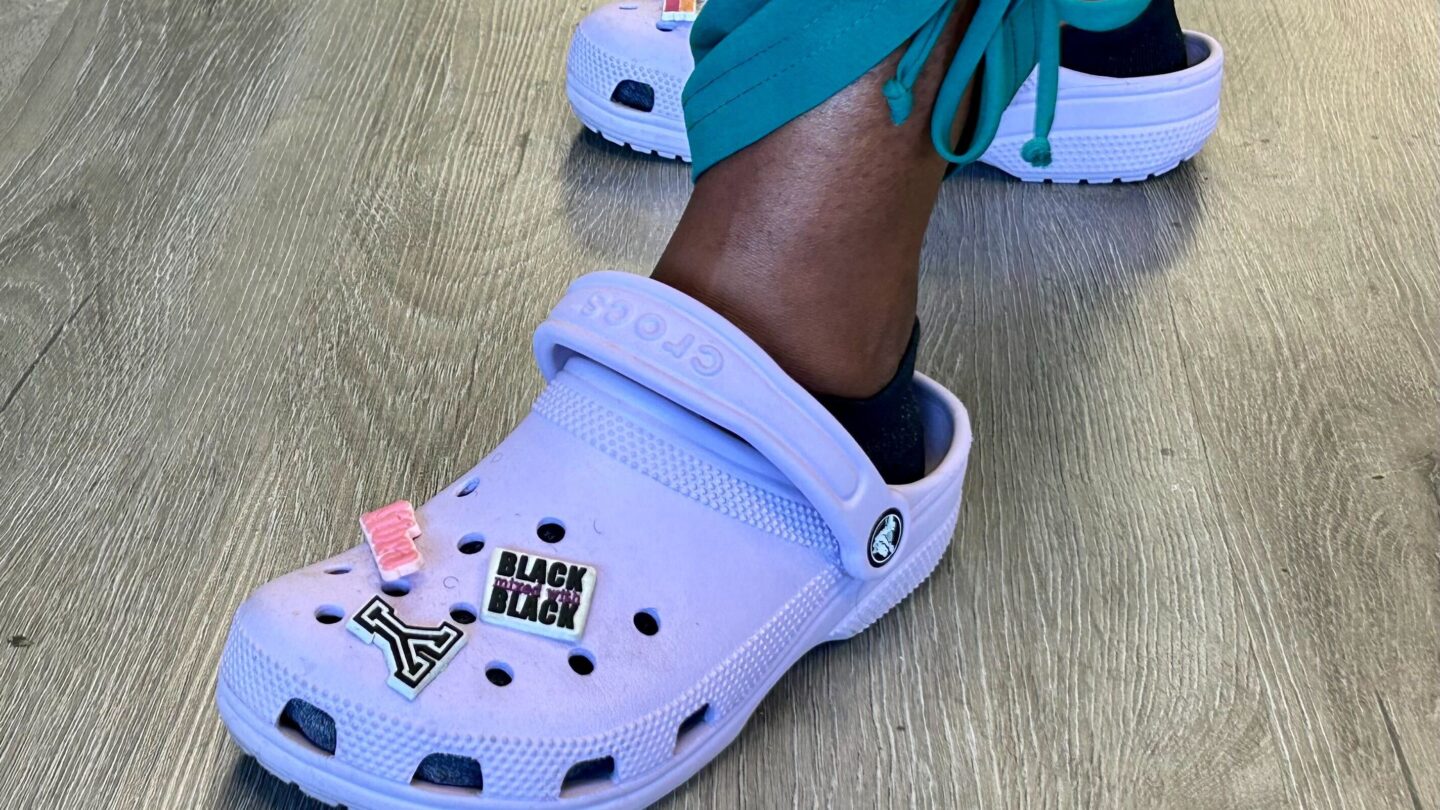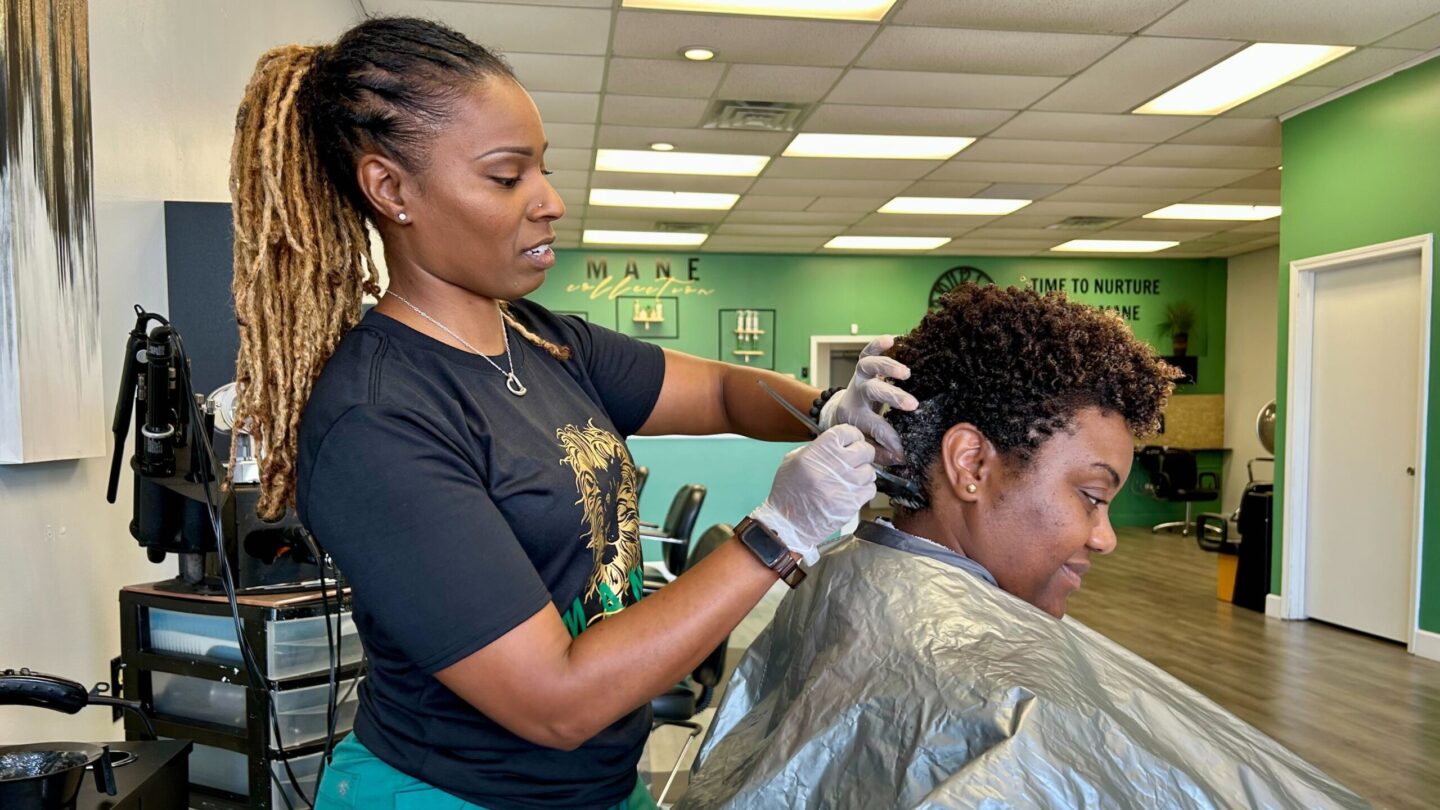Near the front window of her Stone Mountain salon, longtime hairstylist Yolanda Sterling stands behind the barber chair, talking to a client in the mirror.
The client is here for the first time to have her hair colored. She is a little nervous. Sterling quickly puts her at ease as she talks through hair color options.
“Those red and orange tones, those warm tones look really nice, especially when the trees start to change, you get those same kind of elements going on,” she said, “so, I think with your curly hair, it’s going to be gorgeous.”
Sterling co-owns this shop called Mane Nutrients Natural Hair Salon. It’s tucked near the back of a shopping center near Stone Mountain Park. She’s been in the industry almost two dozen years. But a few years ago, Sterling said she felt something was off.
“It was one of those situations where I felt like I was in a funk, a transition phase,” she said.
She had recently closed her previous salon business and was spending a lot of time working alone. So, when a friend invited her to go running one morning with a group of women, Sterling said yes.
“It was an eye-opener,” she said. “And then I figured out I was in like a little depression. It made me pay attention to a lot of things that I had been doing, and I realized I needed the same kind of community.”
She kept working out with the group and said that that sense of community helped Sterling navigate out of her depression. And her experience of facing a mental health challenge inspired her to want to help others.
A friend in the running group told her about the Confess Project of Metro Atlanta, a program that trains stylists to become mental health advocates in their salons and communities. It’s designed to harness the unique rapport a stylist can have with their clients in hopes of connecting more Georgia women of color to mental health resources.
“And our mission has always been to build awareness and break stigma around mental health within the Black community,” said Ursula Berger, Confess Project of Metro Atlanta director of engagement.
“A lot of times, people just want to be heard.”
Yolanda Sterling, co-owner of Mane Nutrients Hair Salon in Stone Mountain, one of the first salons in Georgia to join the Confess Project of Metro Atlanta which trains stylists to become mental health advocates.
It began in 2016 with barbershops in Little Rock, Arkansas, and has so far trained more than 3,000 barbers in at least 30 states.
This year, with funding from a special grant, it’s expanding in Georgia to include women salon owners, cosmetologists, nail technicians and others in the beauty industry. So far, more than 300 salons in the state have signed up.
Mane Nutrients Natural Hair Salon was among the first to join. Sterling said the concept made sense to her, in part because stylists are in a client’s personal space. Trust is critical.
Sterling said she can be a listening ear to her regular clients.
“A lot of women today are dealing with the same type of issues, where it’s concerning their hair and then it can go outside of just their hair.” Sterling said. “I have clients that come in and they are working while they’re getting their hair done. They might be on conference calls or video calls, and just the stresses of what’s going on with work and they hang up the phone and they’re like, ‘Oh my God, they’re driving me crazy.’ And just being able to help them mellow out and sometimes even talk through some crazy stuff that’s going on. Because a lot of times, people just want to be heard.”
The project teaches stylists to listen to clients without judgment and validate their clients’ feelings. And reduce mental health stigma.
“There’s so much stigma around mental health. Like, if I share that I’m having these challenges, I’ll be perceived as weak,” said Dr. Natasha DeVeauuse Brown, a professor of public health at Georgia State University and an advisor to the Confess Project of Metro Atlanta.
As it grows, Brown is studying its long-term effectiveness. She said she can already see the project reaches people of color who may not otherwise seek out mental health care or know where to go for help.
“So the idea is that you know someone, you know what their normal demeanor is, you know what their normal spirit is,” she said. “And now they are quiet, they seem despondent, and a barber would ideally be able to say, OK, something’s different and then begin a dialogue.”
It’s not just talk. The Confess Project of Metro Atlanta also prepares barbers and stylists for what to do if a client is a potential danger to themselves or others. It provides them with information and phone numbers to share with clients needing additional resources.

Organizers hope this mental health model can help reduce disparities in access to care that Georgians of color continue to face in great numbers.
According to the Urban League of Greater Atlanta, the shortage is especially stark in rural communities across Georgia.
Sterling also teaches at Georgia Piedmont Technical College and said she talks to her students about the importance of maintaining their own mental health, too.
“The newer stylists coming into the industry need to understand that you have to be well aware of your own mental health,” she said. “And if you aren’t, there’s nothing you can do for anyone else. And sitting in that chair, even though we are not therapists, people rely on your opinion. They rely on your viewpoint.”
“So it’s really good to be comfortable in that space,” she added. “So, just making people comfortable with understanding that it’s OK to seek out help.”
Sterling said she had to learn that lesson in her own life.
And she’s pushing for Georgia Piedmont Technical College, which is accredited by the Southern Association of Colleges and Schools, to include the Confess Project of Metro Atlanta model as part of the school’s standard stylist curriculum.









